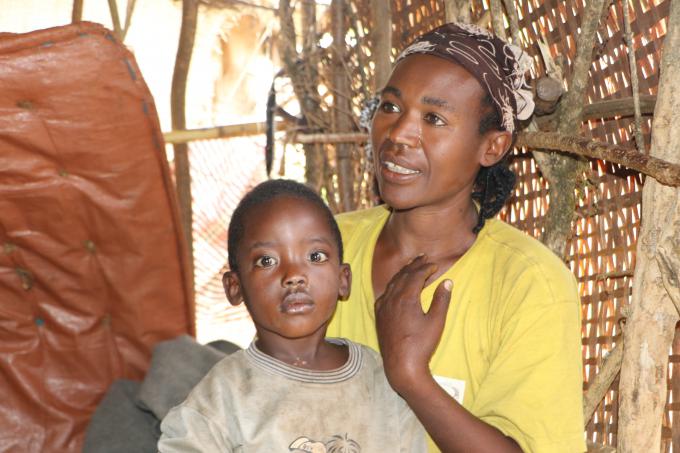Out of Harm’s Way, but in a Camp Full of Shortage: Tigist’s Story
Tigist Daniel, 30, lives with six of her eight children outside of Chelelektu, a small rural town in Kochere Woreda, of Gedeo zone in Ethiopia’s Southern Nations, Nationalities and People’s Region (SNNPR). Displaced due to intercommunal conflict from Chella, a village along the border with West Guji zone of the Oromia region, Tigist and her family are now settling at an IDP camp where they live in a small wooden shelter, covered with plastic roofing.
“We lost all our belongings including the livestock and our house because of the conflict,” recounted Tigist rather sadly. “We carried none of our belongings as we were running away for our lives, and here we are not knowing what to do. There is no work here. Recently, my daughter started to work in a coffee farm, but her earnings are too little to support us. My husband has gone to a nearby town to look for a job. We are struggling hard to survive here,” she explained.
At the IDP camp, Tigist thinks she and her family are out of harm’s way as “it is relatively peaceful here and we feel safer.” Tigist is frustrated even more by the shortage of basic necessities for her and her children. “Our biggest concern now is the shortage of food and drinking water. We drink unsafe and contaminated water that we fetch from an open well. The health clinic was completely destroyed when conflict also erupted here before we came and is no more functional. When our children get sick, we have to walk all the way to Chelelektu town for more than an hour for their treatment at the health center there. The lack of food is also too much to bear, and these days, we often eat dry kocho [thin bread made of false banana] without sauce or meat to it,” Tigist grumbled.
The food handouts are also too small to depend on for families like Tigist’s and she said “The last time we received food was two months ago, when we were given 15 kilos of maize flour, 3 liters of vegetable oil and 50 kilos of wheat.”
Tigist with her four-year old son, Sofonias Daniel, inside their temporary home at the IDP camp
The conflict forced thousands of households like Tigist’s to flee their places of origin and they are struggling to survive in settlement camps where they are yet to get the level of humanitarian support they so much need. Until then, they will continue to live in their poorly made huts in these camps without sufficient food and non-food item supplies. Tigist desperately calls upon the government and humanitarian actors to “rehabilitate the health clinic here and continue to provide us with food assistance and clean drinking water.” Despite the current challenges, Tigist still has high hopes that her children go to school and achieve the highest level of education. “My oldest daughter is a first year student at Hawassa Teacher Training College and want her to finish her studies successfully and become a good teacher,” Tigist aspired.
With the funding from the European Commission of Civil Protection and Humanitarian Aid (ECHO), Save the Children and World Vision are working to improve the situation in four Woredas of Gedeo zone, namely Bulle, Gedeb, Kochere and Wonago through the provision of health, water, sanitation and hygiene services and none food items for people affected by intercommunal conflict in the area.
 Ethiopia
Ethiopia 